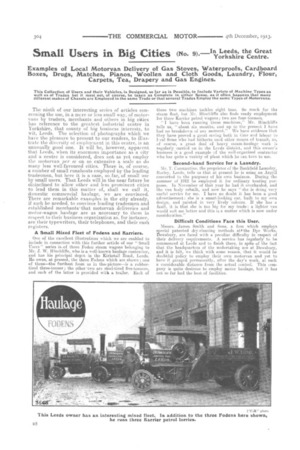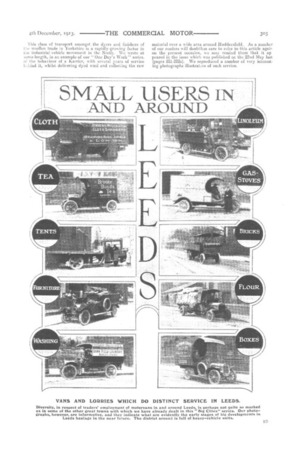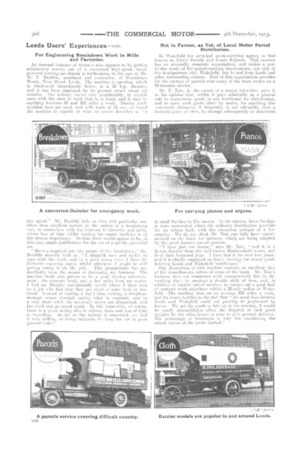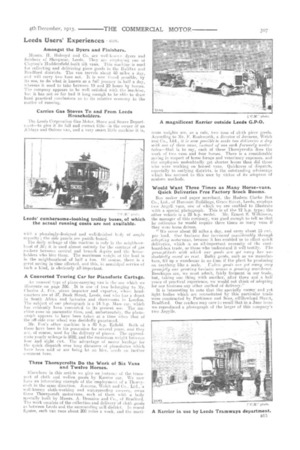Small Users in Big '
Page 4

Page 5

Page 6

Page 7

If you've noticed an error in this article please click here to report it so we can fix it.
Lies (No. 9). In Leeds, the Great
CI
Yorkshire Centre.
Examples of Local Motorvan Delivery of Gas Stoves, Waterproofs, Cardboard Boxes, Drugs, Matches, Pianos, Woollen and Cloth Goods, Laundry, Flour, Carpets, Tea, Drapery and Gas Engines.
This Collection of Users and their Vehicles, is Designed, so Tar as is Possible, to Include Variety of Machine Types as well as of Trades, but it must not, of course, be taken as Complete in either Sense, as it often happens that many different makes of Chassis are Employed in the same Trade or that several Trades Employ the same Types of Motorvans.
The ninth of our interesting series of articles concerning the use, in a mere or less small way, of motorvans by traders, merchants and others in big cities has reference to the greatest industrial centre in Yorkshire, that county of big business interests, to wit, Leeds. The selection of photographs which we have the pleasure to present to our readers, to illustrate the diversity of employment in this centre, is an. unusually good one. It will be, however, apparent that Leeds, when its enormous importance as a city and a centre is considered, does not as yet employ the motorvan per se on so extensive a scale as do many less well-favoured cities. These is, of course, a number of small runabouts employed by the leading tradesmen, but here it is a. case, so ,far, of small use by small users. That Leeds will in the near future be disinclined to allow other and less prominent cities to lead them in this matter of, shall we call it, domestic commercial haulage, we are convinced. There are remarkable examples in the city already, if such be needed, to convince leading tradesmen and established merchantrthat motorvan deliveries and motor-wagon haulage are as necessary to them in respect to their business organization as, for instance, are their typewriters, their telephones, and their cash registers.
A Small Mixed Fleet of Fodens and harriers.
One of the excellent illustrations which we are enabled to include in connection with this further article of our "Small Users '' series is. of three Focien steam wagons belonging to Mr. J. W. Hinchliffe, who is a well-known haulage contractor, and has his principal depot in the Kirkstall Road, Leeds. lie owns, at present, the three Foclens which are shown ; one of these—the furthest from us in thapicture—ie a rubbertired three-tonner ; the other two are steel-tired five-tonners, and each of the latter is provided witia. a trailer, Each of
these two machines tackles eight tons. So much for tho steam fleet, tut Mr. Ifinchliffe also finds ready employment for three Karrier petrol wagons; two are four-tonners.
" I have been running these machines," Mr. flinchliffe tells us, " about six mouths, nod tip to the present I have had no breakdown of any moment." We have evidence that they have proved a great saying both in lime and labour to Iccat firms who had hitherto used other means of transit, as, of course, a great deal of heavy steam-haulage work is regularly carried on in the Leeds district, and this owner's business is a good example of the well-organized contractor who has quite, a variety of plant. which he can turn to use.
Second-hand Service for a Laundry.
Mr, T. Constantine, the proprietor of the Bankfield Laundry, Burley, Leeds, tells us that at present he is using an Argyll converted to the purposes of his own business. During the summer of 1912 he employed it for ordinary touring purposes. In November of that year he had it overhauled, and the van body rebuilt, and now he says " she is doing very useful service for me. I have no. doubt it has been a good advertisement : she is a smart-looking car, built to my own design, and painted in very lively 'colours. If she has a fault, it is that she is too big for my trade a. lighter van would suit me better and this is a matter which is now under consideration."
Difficult Conditions Face this User.
Messrs. James Smith and Sons, a firm which employs special patented dry-cleaning methods at the Dye Works, Dewsbury, are faced with a peculiar difficulty in respect of their delivery requirements. A service has regularly to be commenced at. Leeds and to finish there, in spite of the fact that the headquarters of the undertaking are at Dewsbury, and it is felt, we think with some reason, that it would be doubtful policy to employ th.eir own motorvan and yet to have it garaged permanently, after the day's work, at such a considerable distance fromthe actual control. This com. pany is quite desirous to employ motor haulage, but it has not so far had the best of facilities. 'this class of transport amongst the dyers and finishers of Lbe woollen trade in Yorkshire is a rapidly-growing factor in the industrial.vehiele movement in the North. We wrote at some length, in an example of our " One Day's Work" series. of the behaviour of a harrier, with several years of service bAitul it, whilst delivering dyed wool and collecting the raw material over a wide area around Huddersfield. As a number of our readers will doubtless care to refer to tilts article agair on the present occasion, we may remind them that it ap peared in the issue which was published on the 22nd May last (pages 251-252a). We reproduced a number of very interest• ing photographs illustrative of such service. For Engineering Breakdown Work in Mills and Factories.
An uousnal instance of where a user appears to be getting satisfactory service out of a converted high-speed, largepowered touring-car chassis is forthcoming in the case of Alp. W. T. Drabblc, merchant and contractor, of Providence Works, West. Street, Leeds. The machine in onestion, which is illustrated immediately below, is a 35 hp. Daimler, and it has been employed by its present owner about six months. The mileage varies very considerably, in accordance with the class of work that is in hand, and it may be anything between 60 and 300 miles a week. Donlon steelstudded. tires are used, and with loads of 15 cwt. on hoard the machine is capable of what its owner describes a3 '' a fair speed." Mr. Drabble tells us that this partieular machine does excellent service in the nature of a breakdown van, in coonection with his business in factories and mills, where loss of time whilst waiting for repair facilities is of the utmost importance. So that there would appear to be, in this ease, ample justification for the use ()I a speedy, powerful ear, "Having inquired into the nature of the breakdown," Aft. Drabbie recently told us. "I dispatch men and tackle to cope with the work, and in a peed man ro.:rr, i un re faelories run niug wyain otherwi, I mi t. be pc/dog read y ta rio tlic jobs. This promptitude has un doubtedly bests the means of increasing my business. The machine itself also proves to he a n;orid moving advertisement. On contract work, say, a few miles from my works, I find my Daimlev exceptionally useful where I have men on a job who find that they are short cf. some tools or material. instead of wasting a day's time waiting, a telephone message conies through saying what is required, and in a. very short while the nucesarv stores are dispatched, and the work can go ahead again, to this connection, of course, there is a great saving also in railway fares and loss of time in traxelling. As far as the upkeep is concerned, we find it very trifling, as being engineers we keep the car in good general order."
Not in Favour, as Yet, of Local Motor Parcel Distribution.
In Wakefield the principal goods-carrying agency is that known as Tate's Parcels and Goods Express. This concern has an rmusua.Tly complete organization, and makes a particular study of the parcel-carrying requirements, not only in the headquarters city, Wakefield, but to and from Leeds and other surrounding centres. Part of this organization provides for the cartage of parcels over many of the tram routes on a 10-minutes service.
Mr. F. Tate, in the course of a recent interview, gave it as his opinion that, whilst it pays admirably as a general rule to concentrate goods io one warehouse for distribution, and to carry such goods there by motor, for anything like reasonable distances, it frequently is not advisable, from a financial point of view, to attempt subsequently to distribute
in small batches by like means. In his opinion, horse haulage is more economical where the ordinary distribution provides for no return load, with the exception perhaps of a few empties. We do not think Mr. Tate can fully have experimented on the lines, for instance, which are being adopted by the groat London pas cel carriers, "I have just one, motor," says Mr. Tate, " and it is a Karrier from the well-known'lluddersficid works, and is of their bonneted type. I have had it for over two years, and it is chiefly employed On heavy haulage for mixed goods between Leeds and Wakefield warehouses."
Our illustration of this machine conveys an excellent idea of the miscellaneous nature of some of the loads. Mr. Tate's business does not commence until comparatively late in theworking day ; he employs a doub-le shift of Metl, and, in addition to regular parcel services, he carries out a good deal of contract work anywhere within a 30-mile radius G f Wakefield. The machine does on an average 330 miles a week, and its owner testifies to the fact that " the work done between Leeds and 'Wakefield could ,not pos.3ibly be performed by horses. We get the !,..00ds so late on in the evening, it would be nearly impossiblAto effect the dispatch of such great weights by the older means in time to give prompt delivery. The percentage of breakages is very low considering the mixed nature of the goods carried."
Amongst the Dyers and Finishers.
Messrs. H. Holroyd and Co. are well••known dyers and finishers of Sheepsear, Leeds, They are employing one Of Chtytijn'S IilidderSfieldbUlit tilt Van.S. This machine is used fur collecting and delivering piece goods in the Halifax and Bradford districts. The van travels about 40 miles a day, and will carry two tons net. It i5 nOW found possible, by its Ilse, to do what is known as a full journey in half a day, whereas it used to take between 19 and 20 h-ours by horses. The company appears to be well satisfied with the machine, but it has 11.0t so far had it long enough to be abl,a todraw hard practical conclus-ions as to its relative economy in tho matter of running.
Carries Gas Stoves To and From Leeds Householders.
The 144.As Corporation Gas Meter, Stove and Stores Department—to give it its full and correct title—is the owner of an AlHays and Onions van, and a very smart little machine it is, with a pleasingly-designed and well-finished hAy of ample capacity ; the side panels are paddle-boxed. The daily mileage of this machine is only in the neighbourhood of ,30; it is used almost entirely for the carriage of gas cookers between centz'al and branch depots and the householders who hire them. The maximum weight of the load is in the neighbourhood of half a ton. Of course, there is a great saving in time effected, and this, in municipal service of such a kind, is obviously all-important.
A Converted Touring Car for Pianoforte Cartage.
An minsnal type of piano-carrying van is the one which we illustrate on page 306. It is one •of two belonging to Mr. Charles .1. Fox, piano importer and exporter, whose headquarters are at 37; Bank Street, Leeds, and wbo has a depot in South Africa and factories and showrooms in London. The subject of our photograph is a 14 h.p. Mass car, which lias evidently been converted to its present use. The machine runs on pneum.atic tires, and, unfortunately, the photograph appears to have been taken at a time when that -of the off-side rear wheel was decidedly punctured.
Mr. Fox's other machine is a 40 h.p. Enfield. Both of these have been in his possession for several years, and they are, of course, used for the delivery of pianos. Tim approximate yearly mileage is 5000, and the maximum weight between lour and eight cwt.. The advantage of motor haulage for tinquick dispatch over long distances of Manofortes which have been sold or are being let on hire, needs no further comment here.
Three Thornycrofts Do the Work of Six Vans and Twelve Horses.
Elsewhere in this article we give an instane::, of the transport of cloth and wollen goods by !farrier car. We now have an interesting el.:ample of the employment of a Thornycroft in the same direction. th`liTIQ118, We7Ch and Co., Ltd., awell-known cloth-working and waterproofing concern, owns three Theemyeroft motorvans. each of them with a body specially built by Messrs. A. bentairte and Co., of Bradford. • .
The work consists of the collection and delivery of cloth goods as between Leeds and thesurrounding mill district. In round fignres, each van runs about 200 miles a week, and the maxi
mum weights are, as a rule, two tens of cloth piece goods. According to Mr. F. Hushwerth, a director of Jennens, Welch and Co., Ltd., if is now possible to make rwo deliveries a day with onc of these vans, instead of one each formerTy undertaken—that is to say, each of these Thornycrofts does the work of two vans ahd four horses. There is a considerable saving in respect of horse forage and veterinary expenses, and the employees undoubtedly. get shorter hours than did those v,lio were working on horsed vans. Quickness of dispatch, especially to outlying districts, is the outstanding advantage which has accrued to this user by virtue of its: adoption of modern methods.
Would Want Three Times as Many Horse–vans. Quick Deliveries Free Factory Stock Rooms,
Box maker and paper merchant, the Hudson Clarke Box Co., Ltd., of Harcourt Buildings, Grace Street, Leeds, employs two Argyll vans, one of which we are enabled to illustrate with a. special phetegra-ph. This is of the 12 h.p. type; the other vehicle is a 22 h.p. model. Mr. Ernest S. Wilkinson, the manager of this company, was good enough to tell us that he estimates he would require three times as many vans if they were horse driven.
" We cover about 60 miles a day, and carry about 15 cwt. per load. Our busine6s has increased cousiderably through adopting motorrans„ because it has enabled us to effect quick deliveries, which is an all-important necessity of the cardboard-box trade, as those who understand it will testify. Tins prompt;tude with whieh. our goods are !..lot ama y has ndoatedly saved as rent. Bulky goods, such as we manufacture, fill up a warehousein no time if the plant be producing on anything like a scale. Unless g0od3 Ors fpg away 'very promptly owr growing busine8s means a growng warehouse. Breakages a-re, we must admit, fairly frequent in our trade, but, taking (MO thingwith another, after t•hree and a half years of practical experience, we would not think of adopting for our business any other method of delivery."
It is intffi,esting to note thatthe specially roomy and yet light bodies which are necessitated by this particular trade were constructed by Parkinson and Sons,. of.iBowlaad Street, Bradford. Our readers may care to recall that in a Jnne isF-. 11 e, we reproduced a photograph of the larger of this company's two Argylis.
























